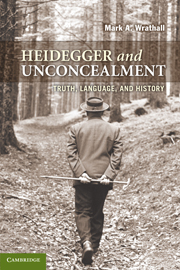Book contents
- Frontmatter
- Contents
- Acknowledgments
- Credits
- Introduction
- Part I Truth and Disclosure
- 1 Unconcealment
- 2 The Conditions of Truth in Heidegger and Davidson
- 3 On the “Existential Positivity of Our Ability to be Deceived”
- 4 Heidegger on Plato, Truth, and Unconcealment: The 1931–1932 Lecture on The Essence of Truth
- Part II Language
- Part III Historical Worlds
- Works by Heidegger
- Index
- References
2 - The Conditions of Truth in Heidegger and Davidson
Published online by Cambridge University Press: 05 June 2012
- Frontmatter
- Contents
- Acknowledgments
- Credits
- Introduction
- Part I Truth and Disclosure
- 1 Unconcealment
- 2 The Conditions of Truth in Heidegger and Davidson
- 3 On the “Existential Positivity of Our Ability to be Deceived”
- 4 Heidegger on Plato, Truth, and Unconcealment: The 1931–1932 Lecture on The Essence of Truth
- Part II Language
- Part III Historical Worlds
- Works by Heidegger
- Index
- References
Summary
An indirect concern of this chapter is to show that, despite dramatic differences in approach, “analytic” and “Continental” philosophers can be brought into a productive dialogue with one another on topics central to the philosophical agenda of both traditions. Their differences tend to obscure the fact that both traditions have as a fundamental project the critique of past accounts of language, intentionality, and mind. Moreover, writers within the two traditions are frequently in considerable agreement about the failings of past accounts. Where they tend to differ is in the types of positive accounts they give. By exploring the important areas of disagreement against the background of agreement, however, it is possible to gain insights unavailable to those rooted in a single tradition.
The direct concern here is to illuminate Heidegger’s account of truth and unconcealment through a comparison with Davidson’s accounts of the conditions of truth. I begin, however, with a brief discussion of some crucial differences between the analytic and Continental ways of doing philosophy. An understanding of these differences provides the basis for seeing how Heidegger and Davidson, all appearances to the contrary, in fact follow a parallel course by resisting theoretical attempts at the redefinition or reduction of our pretheoretical notion of truth. Indeed, both writers believe that truth is best illuminated by looking at the conditions of truth – that is, they both try to understand what makes truth as a property of language and thought possible in the first place. Both answer the question by exploring how what we say or think can come to have content. I conclude by suggesting that Heidegger’s “ontological foundations” of “the traditional conception of truth” can be seen as an attempt at solving a problem that Davidson recognizes but believes is incapable of solution – namely, the way the existence of language and thought presuppose our sharing a finely articulated structure that only language and thought seem capable of producing.
Information
- Type
- Chapter
- Information
- Heidegger and UnconcealmentTruth, Language, and History, pp. 40 - 56Publisher: Cambridge University PressPrint publication year: 2010
References
Accessibility standard: Unknown
Why this information is here
This section outlines the accessibility features of this content - including support for screen readers, full keyboard navigation and high-contrast display options. This may not be relevant for you.Accessibility Information
- 1
- Cited by
